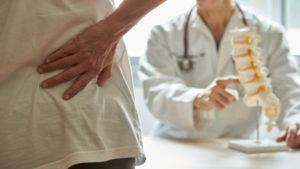
Back injuries can take many forms. Your back includes muscles, tendons, ligaments, vertebrae, and discs. Stress on your back can damage any of these structures.
But when you injure a disc, you can develop symptoms that radiate into your limbs. This happens when an injured disc presses on nerve roots near your spinal cord. The symptoms from such injuries can temporarily or permanently disable you.
Below, you will learn about bulging, ruptured, and herniated discs. You will also learn about the compensation you can seek for traumatic disc injuries.
Table of Contents
Your Spine
Your spine has 24 vertebrae. The joints between your vertebrae allow your back to bend, flex, and twist. At the same time, your vertebrae can stack on top of each other to form a column that supports the weight of your arms, upper body, and head.
Each vertebra has a cylindrical body and several wing-shaped processes. The bodies provide structural support when they align to form the spinal column. Tendons and ligaments attach to the processes. The spinous process helps your muscles provide movement and strength to your back.
Intervertebral discs sit between the vertebrae to cushion them. These discs have a cylindrical shape. Each disc includes a structure known as the fibrous annulus, which surrounds a gel-like nucleus. This structure absorbs shocks when you stand, walk, run, or jump.
Discs also prevent the vertebrae from wearing out. They have a smooth, tough surface. The vertebrae move on the surface of the discs instead of grinding against each other.
Your spinal cord runs through your spine. It connects your brain to everything in your body below your neck. As it passes through the spinal canal, the spinal cord branches into nerve roots.
The nerve roots branch from the spinal cord at each disc. These nerve roots carry nerve signals to a body region such as your right hand or left leg.
How Accidents Cause Herniated Discs
Discs usually get damaged when they get compressed. Disc compression can happen in several types of accidents, including:
Falls
When you hit the ground, the impact can compress your discs. When the discs compress, the deformation can permanently damage them. This type of injury can result from elevated falls or slip and fall accidents.
Car Accidents
Car accidents cause your spine to hyperextend and compress as your body whips back and forth in a collision. During hyperextension, the vertebrae and discs separate slightly. As the spine compresses, the discs get crushed between the vertebrae.
Workplace Accidents
Workplace accidents can damage discs as well. Lifting something that’s too heavy can cause disc trauma. Overuse can also wear out discs.
Work-related disc injuries are more likely to happen to people who perform repetitive motions like standing, walking, lifting, or carrying. Workers also have an increased risk of these disc injuries if they have degenerative disc disease. Degenerative disc disease happens when the discs dry out and lose their elasticity due to age.
Types of Disc Injuries
When your discs deform, they can press on nerve roots near the spine. The nerves inflame and misfire. The misfired signals cause you to experience pain where you have no injuries.
For example, an injured disc in your neck could press on a nerve root leading to your shoulder. As a result, you might feel pain in your shoulder even though your shoulder was not injured in your accident.
You might sometimes see the term “herniated discs” used to refer to all disc injuries. But discs can suffer three types of injuries, and herniation refers to only one of them. The three injuries include:
Herniated Discs
A herniated disc happens when the fibers of the annulus around the perimeter of the disc separate. The nucleus squeezes between the fibers and forms a bump on the side of the disc. This bump pushes on nearby nerves.
Ruptured Discs
A ruptured disc happens when the fibers on the top or bottom of the disc separate. The disc cracks, and part of it can push outward under your weight. As the cracked disc pushes outward, it can press on a nerve root.
Bulging Discs
A bulging disc happens when the fibers of the annulus weaken but do not separate. The disc sags around the middle, so it has a barrel shape rather than a cylinder shape. The bulge compresses nearby nerves.
Symptoms of Ruptured, Bulging, and Herniated Discs
A ruptured, bulging, or herniated disc can destabilize your back. It can limit your range of movement and weaken your back.
But if it presses on a nerve root, it can cause debilitating symptoms, such as:
- Painful sensations that radiate from your back into a limb
- Loss of or change in dexterity
- Burning sensation
- Electrical buzzing
- Numbness
- Tingling
These symptoms could become chronic, or they may recur intermittently and unexpectedly.
Unfortunately, doctors cannot repair a damaged disc. They also have no reliable treatment options for a damaged disc. Doctors can leave the disc in place and inject anti-inflammatories into the nerve root. This does not prevent the disc from compressing the nerves, but it can reduce the inflammation and misfiring of the nerves.
Your doctor can also remove the disc and close the gap where it was. They will use screws and plates to fuse the vertebrae without a disc between them. When a doctor fuses the vertebrae, the remaining vertebrae feel additional stresses that can, in turn, damage the next disc in the spine.
Your doctor can also remove the disc and replace it with an artificial disc. Using an artificial disc may avoid some of the problems of fused vertebrae. But an artificial disc will not provide the cushioning or support of a natural disc.
Getting Compensation for Herniated Discs
If you suffered a herniated disc at work, you can pursue compensation through your employer’s workers’ compensation insurance. Workers’ comp benefits pay for all of your medical treatment and part of your lost wages.
If you injured a disc in a car accident, your rights depend on whether you elected a full tort or limited tort auto insurance policy.
Contact a Pennsylvania Personal Injury Lawyer for Help
A herniated disc can cause lifelong symptoms that interfere with your ability to work and meet your daily needs. To discuss the compensation you can get for your herniated disc, contact Marzzacco Niven & Associates for a free consultation. Our personal injury lawyers are here to help, give us a call today at (717) 231-1640.
